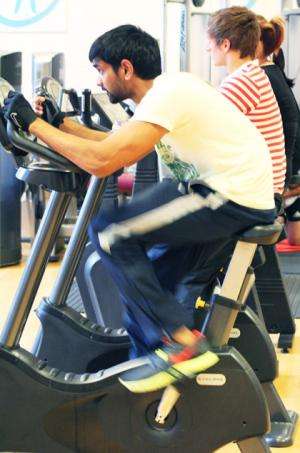Get fit post-Olympics in just 60 seconds, say researchers

(Medical Xpress)—A new paper published this month by researchers at the University of Abertay Dundee suggests that anyone inspired to get fit by the Olympics and Paralympics can do so in just 60 seconds.
Using a sequence of six-second sprints, one of the shortest sprint durations ever used in high-intensity training (HIT), researchers found that fitness levels of participants in the study increased by more than 10 per cent after only two weeks.
HIT involves short bursts of intense exercise and achieves similar results to long-distance endurance training. However, it is much less time consuming and comes with a lower risk of injury, making it ideal for elite athletes like Mo Farah and Jessica Ennis, who strive to remain injury free.
For this study, researchers tested the effectiveness of extremely short high-intensity sprints on "sub-elite" triathletes rather than professional sports people, but say they could just as easily have recruited people who play rugby or football on a regular basis instead, and that they would have seen the same improvements in fitness.
At the beginning of the study, all participants were asked to complete a self-paced 10km cycled time trial as quickly as they could. They were then divided into two groups: the first was to undergo three sessions of HIT a week, for two-weeks, while the second acted as a control group.
For the HIT group, each of the six sessions consisted of cycling all out for six-seconds, resting for one minute, and then repeating the sprint a total of ten times.
This amounted to just 60 seconds of exercise per session, with three sessions being completed each week.
At the end of the fortnight, subjects from both groups were again asked to complete the time trial, and all those who had done the HIT programme finished 10 per cent faster than they had the time before.
Lead author of the study, Dr John Babraj from Abertay University's School of Social and Health Sciences, says that one of the reasons for the dramatic improvement in fitness levels in such a short space of time was down to the effects the six-second sprints have on the body's ability to use a substance called lactate. He explains:
"During the Olympics you'll probably have heard some of the athletes in post race interviews talking about the lactic acid that's built up in their legs, which they say causes them pain and slows them down. Lots of people in sport talk about lactic acid affecting them in this way, but what they're actually referring to is a substance called lactate which appears in the bloodstream during exercise.
"However, far from causing pain, lactate is actually a useful fuel that the body makes during exercise to enable it to perform at a higher level for longer.
"At the end of a race, the blood is often saturated with lactate because the body can't use it up quickly enough, but it is just a coincidence that this occurs at the same time as an athlete starts to seize up and slow down.
"In this study, we looked at the time it took for lactate to build up in the blood and found that it occurred more slowly after doing 60 seconds of short sprints.
"This suggests that the short sprints make it possible for the body to use the lactate more efficiently, and means that people who do this kind of HIT will be able to perform better in their chosen sport.
"But the results of this study aren't just relevant for people already taking part in sport. Anyone who's been inspired by the Olympics to get fit and be more active, but perhaps thinks it'll involve spending hours in the gym pounding the treadmill, could do 60 seconds of exercise three times a week and be much fitter and healthier in only a fortnight."
The study, entitled "Extremely short duration high-intensity training substantially improves endurance performance in triathletes" is published in the October edition of Applied Physiology, Nutrition and Metabolism.
















